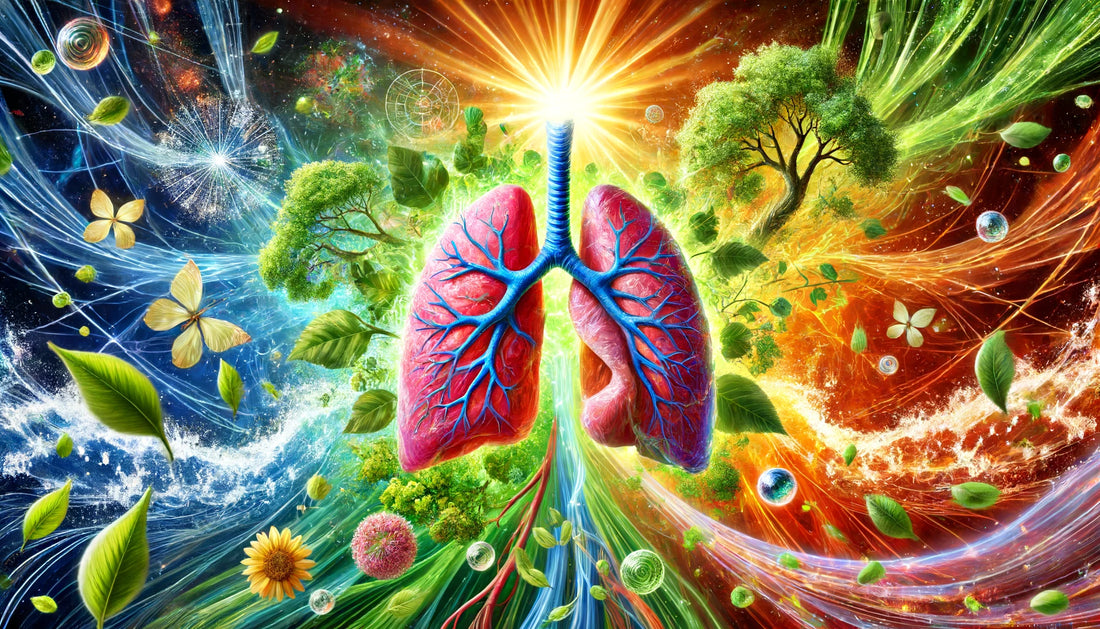
Why Lung Health Matters
Share
Why Lung Health Matters
- Oxygen Supply and Energy Production
The primary function of the lungs is to facilitate gas exchange—oxygen in, carbon dioxide out. This process is crucial for energy production at the cellular level. Healthy lungs ensure that all bodily tissues receive the oxygen they need to function, repair, and thrive. Compromised lung function can lead to decreased oxygen levels in the blood, making simple activities like walking or climbing stairs feel exhausting.
- Immune Defense
The lungs play a critical role in immune defense. They act as a barrier against airborne pathogens and pollutants. The mucus in the lungs traps dust, allergens, and microbes, which are then expelled from the body through coughing or sneezing. Healthy lungs are more effective at clearing unwanted substances and less susceptible to infections and inflammation.
- Detoxification
Every day, we breathe in various pollutants, from vehicle exhaust to industrial emissions and tobacco smoke. The lungs filter out harmful substances and expel them from the body. Maintaining healthy lungs enhances this natural detoxification process, reducing the risk of respiratory conditions and diseases.
- Quality of Life
Healthy lungs are essential for maintaining an active lifestyle. Good pulmonary health allows you to engage in physical activities without discomfort, enhancing cardiovascular fitness and overall health. Conversely, poor lung health can lead to a sedentary lifestyle, which is associated with higher risks of several chronic diseases, including obesity and type 2 diabetes.
Threats to Lung Health
Modern lifestyle factors pose significant threats to pulmonary health:
- Air Pollution: Exposure to particulate matter and noxious gases can lead to chronic respiratory diseases like asthma and chronic obstructive pulmonary disease (COPD).
- Smoking: Tobacco smoke is one of the leading causes of lung cancer and COPD worldwide.
- Sedentary Lifestyle: Lack of physical activity can weaken the respiratory muscles and reduce lung function over time.
- Occupational Hazards: Exposure to chemicals, dust, and fumes in certain workplaces can significantly impair lung health.
- Infections: Respiratory infections, if recurrent or chronic, can cause lasting damage to lung tissue.
How to Maintain and Improve Lung Health
- Avoid Smoking
Quitting smoking is the single most effective action you can take to protect your lung health. If you don't smoke, avoid secondhand smoke and other inhaled toxins.
- Monitor Air Quality
Pay attention to air quality forecasts, especially on high-pollution days. Limit outdoor activities when air quality is poor, and use air purifiers indoors to reduce indoor air pollutants.
- Exercise Regularly
Physical activity helps strengthen the respiratory muscles and improves lung capacity. Cardiovascular exercises, in particular, can enhance lung efficiency and overall health.
- Practice Breathing Exercises
Techniques like diaphragmatic breathing and pursed-lip breathing can improve lung capacity and efficiency, especially helpful for those with chronic lung conditions.
- Maintain a Healthy Diet
A diet rich in antioxidants from fruits and vegetables can help combat inflammation in the lungs caused by exposure to pollutants.
Conclusion
The health of your lungs is a cornerstone of overall vitality and quality of life. In our modern world, where environmental and lifestyle factors constantly challenge lung health, taking proactive steps to maintain and improve pulmonary function is crucial. By adopting healthier lifestyle choices and monitoring environmental conditions, you can ensure your lungs are equipped to support you at your best. Breathe easy, and take care of your lungs—they’re your support system for life.
